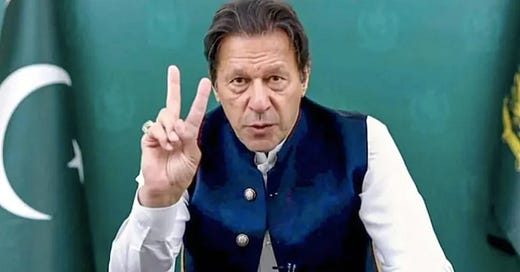The Rise and Fall of Imran Khan
Following his removal from office, Khan's voters continued to support him in several massive rallies across Pakistan. Could this be indicative of a second rise to power in the future?
Originally from Abbottabad, Pakistan, Umer Farooq is now a graduate student at the Max Bell School of Public Policy. Prior to this, he completed his PhD in Engineering at the University of Calgary. This article was previously published on It Was Always Burning of the School of Public and International Affairs, Columbia University.
Write us at newsletterthebell@gmail.com.

WITH ALL THE POLITICAL UNCERTAINTIES IN PAKISTAN on any given day, the last couple of weeks were especially surprising when the country was pushed towards an unprecedented constitutional crisis. Former Prime Minister Imran Khan declined to play by the rules, leading to his removal from office. He is the first prime minister in Pakistan's history to lose a no-confidence vote – a distinction nobody wants.
With all the popularity he earned through cricket and philanthropy; Khan remained an outsider to political processes until 2010. Khan realized that in order to gain voter support, he needed to target the urban and educated middle classes which emerged as a result of the expansion of the services sector. Before his outreach efforts, this class remained the least engaged in the political process. He then managed to mobilize them against the financial corruption of the then ruling government of Pakistan Muslim League Nawaz (PML-N). In addition to spotlighting mass corruption, Khan highlighted the implications of continuing dynastic politics on Pakistan’s sociopolitical and economic conditions. This anti-nepotism rhetoric was popular amongst the youth and the educated middle class.
To fully realize his ambitions of ruling Pakistan, Khan had to gain the approval of the military. Although Pakistan is a constitutional democracy, the military holds significant, and, at times, unchallengeable power. Since Pakistan’s independence in 1947, three military dictators have ruled the country. Although the military has not directly ruled Pakistan since 2008, the civil-military establishment remains intact. Khan understood that his popularity amongst the voting base wasn’t enough to achieve prime ministership and that he needed military support. The military, on the other hand, thought of Khan as a politician who could comply with their political pursuits. As such, the generals helped pave the path to Khan’s victory in the 2018 national elections. On top of that, the incumbent party leader, Nawaz Sharif, was ousted from office by a judicial court’s decision on corruption charges against him just before the 2018 national election. These elements facilitated Khan’s victory: The making of Naya Pakistan (New Pakistan), Khan’s election slogan, was set to begin.
Khan made the grave mistake of hyper-focusing on the opposition’s corruption charges—an opposition that was no longer in power—than he did on governance. He lacked the political acumen needed to successfully rule a country as complex as Pakistan, leading to significant failures in the health, education, and economic sectors. The country’s GDP fell dramatically. The ill-designed Single National Curriculum that streamlined curriculums across the nation breached the constitutional rights of provincial governments to determine educational policy as stated in the 18th amendment of the constitution. Additionally, no practical steps to educate more than 22 million out-of-school children. Khan’s government was able to manage the COVID-19 pandemic exceptionally well and launched a commendable Sehat Card welfare program that ensured under-privileged citizens were able to access healthcare facilities. However, the overall situation of the public health sector remained dismal. In a surprising turn of events, Khan’s government suffered defeat in the first phase of municipal elections in the province of Khyber Pakhtunkhwa in early 2022, extending an opportunity for the opposition to remove Khan from power through a no-confidence vote.
Politicians and allies that had supported Khan in 2018 were disillusioned by his governance style, parting ways with his party a few weeks before the no-confidence motion. He quickly lost majority support in the parliament. He blamed foreign conspirators for bringing down his regime to appeal to his voter base and to present himself as an anti-imperialist leader of a sovereign Muslim nation. Although Khan’s foreign conspiracy rhetoric was uncorroborated, the deputy speaker of the parliament dismissed the no-confidence motion, stating a foreign conspiracy was at play, inviting an unprecedented constitutional crisis. The Supreme Court of Pakistan declared this ruling by the deputy speaker unconstitutional and ordered the speaker to proceed with the no-confidence vote. The Supreme Court’s verdict was seen as a victory for constitutional integrity and democracy. Imran Khan was ousted as the Prime Minister of Pakistan on April 9.
Time will tell whether this is the end of Khan’s political career. One certain thing is his ousting has increased political polarization in the country. Following his removal, Khan organized massive rallies in the urban centers of Lahore, Karachi, and Peshawar, displaying the support of his still intact voter base. This voter base has been especially galvanized by Khan’s assertions of foreign meddling in Pakistan’s politics. Khan is out but the nation is more divided than ever. Nonetheless, the new government, led by the president of PML-N and a seasoned politician, has shown resolve in the face of increasing instability The government should work towards strengthening democracy and promoting inclusionary politics to establish a more equal and peaceful Pakistan.
The Bell is edited by Jaclyn Victor, Jason Kreutz, Shweta Menon and Phaedra de Saint-Rome of the Max Bell School of Public Policy at McGill University.





The ruling corrupt govt doesn't deserve to be called a 'seasoned politician' in a good way. Democratic outcry of millions Pakistanis is a very visible expression of rejecting the political dynasty. They have failed to perform in the past, hence have lost the support. Improvement in governance is a long term process and none of these politicians have laid its foundation. Alas! Yet again She is entrapped by political dynasty.